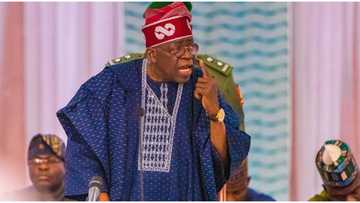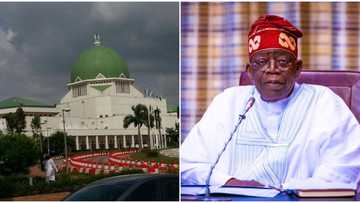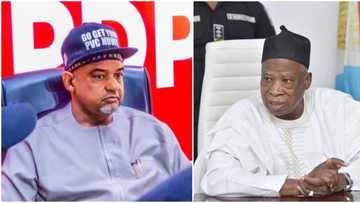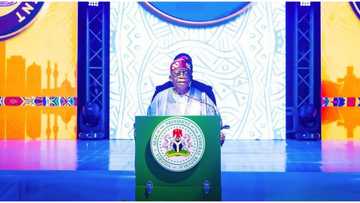5 Nigerian Governors Who Handed Over Power to Their Deputies and Why They Did So
On Thursday, March 19, 2020, a huge crowd at the Danbaba Suntai Airport, Jalingo, welcomed Governor Darius Ishaku back to Taraba state.
Unlock the best of Legit.ng on Pinterest! Subscribe now and get your daily inspiration!
PAY ATTENTION: Join Legit.ng Telegram channel! Never miss important updates!
Why such a huge crowd welcoming a governor back to his state, you asked?
Governor Ishaku had spent 87 days outside Taraba state, without handing over power to his deputy!

Source: Twitter
Media reports indicate Ishaku left Taraba for Abuja shortly after he presented the 2020 budget to the State House of Assembly on Thursday, December 19, 2019.
PAY ATTENTION: Join Legit.ng Telegram channel! Never miss important updates!
While in Abuja, he had travelled to the United Kingdom where he was said to have undergone surgery on one of his legs and thereafter returned to Abuja where he stayed until March 19, 2020.
During his prolonged absence, the All Progressives Congress (APC), the opposition party in the state, called for the handing over of power to his deputy.
Sadly, the deputy governor and the Speaker of Taraba State House of Assembly, Joseph Albasu Kunini, who was supposed to uphold the constitution faulted the APC’s call and accused the APC of mischief.
Ishaku's media aide, Bala Abu, also argued that his principal was discharging his official duties and responsibilities without any hindrance from Abuja where his doctor advised him to stay.
Fast forward to 2021, a similar incident happened when Governor Rotimi Akeredolu of Ondo state contracted COVID-19 and had to go on self-isolation.
Akeredolu’s then deputy, Agboola Ajayi, demanded to be made the acting governor while his principal recovers from the virus, citing the relevant constitutional provisions.
However, Governor Akeredolu refused to hand over power to him; for obvious political reasons. At the time Agboola was making the demand, he and Akeredolu were already on a warpath. He had also left the ruling party in the state, APC, for the PDP.

Read also
President Tinubu reacts to killings in Plateau, Benue, Gives 1 crucial order to security agencies
What does the Constitution say?
Section 190, subsections 1 and 2, of the 1999 Constitution of the Federal Republic of Nigeria (as amended) addresses this situation.
“1. Whenever the Governor is proceeding on vacation or is otherwise unable to discharge the functions of his office, he shall transmit a written declaration to the Speaker of the House of Assembly to that effect, and until he transmits to the Speaker of the House of Assembly a written declaration to the contrary, the Deputy Governor shall perform the functions of the Governor as Acting Governor.
2. In the event that the Governor is unable or fails to transmit the written declaration mentioned in subsection (1) of this section within 21 days, the House of Assembly shall, by a resolution made by a simple majority of the vote of the House, mandate the Deputy Governor to perform the functions of the office of the Governor as Acting Governor, until the Governor transmits a letter to the Speaker that he is now available to resume his functions as Governor.”
The governors who followed the Constitution
Unlike the two governors examined above, there are some governors who demonstrated their commitment to upholding the Constitution by handing over power to their deputies when it was necessary to do so.
1. Governor Nasir El-Rufai (Kaduna state)
Governor Nasir El-Rufai has handed over power to his deputies at least two times; during his first and second terms.
In 2017, the Kaduna state governor handed over to his deputy, Barnabas Yusuf Bala, when he briefly travelled out of the country for his part-time PhD programme. Bala served as the acting governor until El-Rufai’s return.
Also in 2019, during his second term, Governor El-Rufai handed over power to his deputy, Hadiza Balarabe. Among other key duties, Balarabe presented the 2020 Draft Estimates of Revenues and Expenditure to the Kaduna State House of Assembly in her capacity as the acting governor.

Read also
Anxiety as National Assembly awaits President Tinubu’s ministerial list 18 days to deadline
2. Governor Abdullahi Sule (Nasarawa state)
In December 2020, Governor Abdullahi Sule of Nasarawa state travelled to the United States of America for a medical check-up.
In accordance with the provisions of the constitution, the governor notified the state House of Assembly of his trip and handed over power to his deputy.
3. Governor Babagana Zulum (Borno state)
At the time of this report, Borno deputy governor, Usman Kadafur, is in charge of the northeastern state.
He is to serve as the Acting Governor of the State until Wednesday, May 19, 2021. This follows Governor Babagana Zulum’s decision to embark on a 21-day vacation.
Before embarking on the vacation, Governor Zulum wrote the House of Assembly and gave his deputy the full powers to handle Borno State’s affairs without resort to him as the constitution stipulates.
4. Governor Rotimi Akeredolu (Ondo state)
Interestingly, Governor Akeredolu who refused to hand over power to his former deputy, Agboola, during his first term has now made his new deputy, Lucky Orimisan Aiyedatiwa, the acting governor.

Read also
Atiku or Tinubu? Fayose finally reveals candidate he supported during 2023 presidential polls
The governor took the decision following his decision to go on a 15-day working vacation.
5. Governor Okezie Ikpeazu
In June 2020, the governor of Abia state, Okezie Ikpeazu, announced that he tested positive for COVID-19.
While he went on self-isolation, Governor Ikpeazu directed his deputy, Rt Hon Ude Oko Chukwu, to act on his behalf.
PAY ATTENTION: Install our latest app for Android, read best news on Nigeria’s #1 news app
In other news, popular lawyer Festus Ogun has weighed in on the constitutionality of President Buhari’s failure to hand over to Osinbajo before his last trip to the United Kingdom.
Ogun argued that the president’s failure to transmit power to his deputy before leaving the country is against the constitution
The legal analyst also described as misleading the presidency’s argument that it is unnecessary for the president to hand over to his deputy.
Source: Legit.ng




